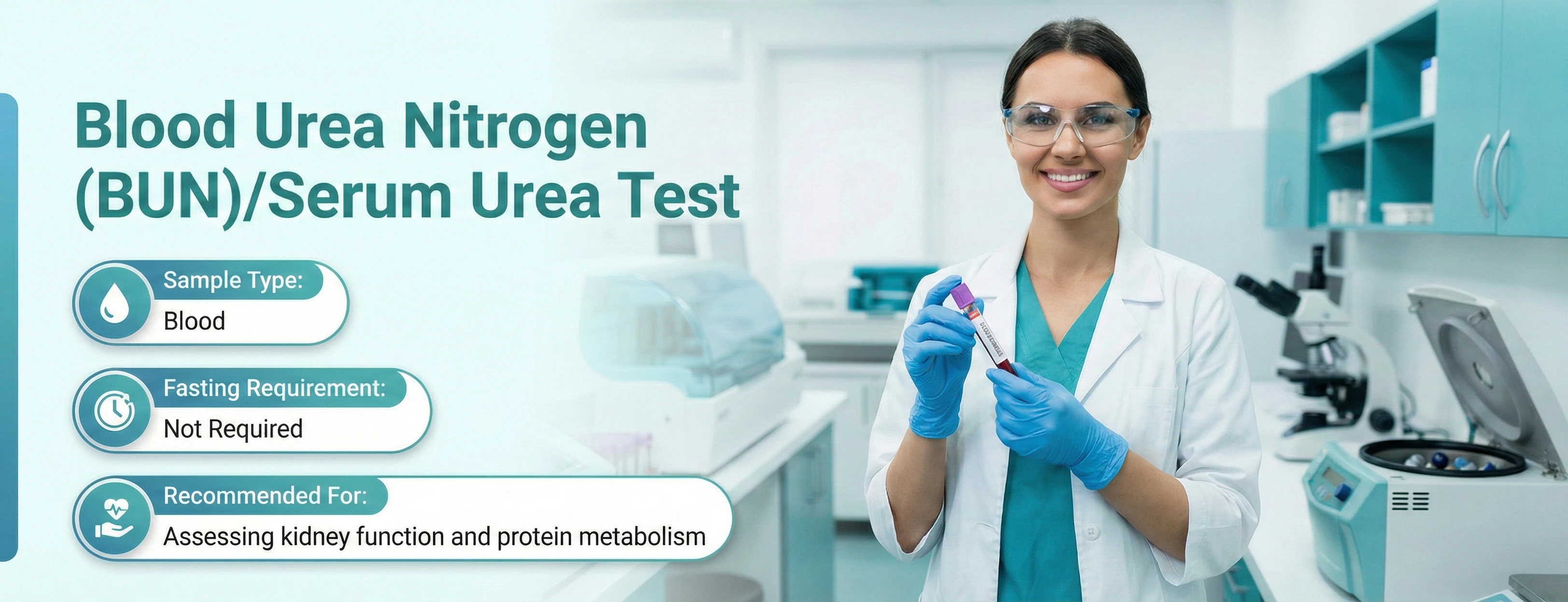778+ orders placed in your location
100% NABL & ISO Certified Lab • 100% Accurate Reports
Blood Urea Nitrogen (BUN)/Serum Urea Test
BUN Test, Urea Nitrogen Test, Serum Bun Test
- SummaryThe BUN/Serum Urea test measures the amount of urea nitrogen in the blood to assess kidney function and hydration status. Elevated levels may indicate kidney disease or dehydration. The test is done using a blood sample, and fasting is usually not required, though some doctors may recommend it depending on other tests.Read more
- Reports Within10 HrsView Sample Report100% NABL & ISO Certified Labs
- SampleBlood
- AgeAll Age Group
- GenderMale and Female
- FastingNot Required
PharmEasy Promises
Know More About The Test
A quick info on Blood Urea Nitrogen (BUN)Serum Urea Test
Overview
Blood Urea Nitrogen Test is done as a part of the entire body checkup process. Doctors usually recommend it during the health screening process. It helps them see whether your kidneys are working properly or not.
Urea Nitrogen is the waste that your body creates after you eat. The liver breaks down the protein present in your food. This produces ammonia which also contains nitrogen. The nitrogen combines with other elements like hydrogen, carbon and oxygen to form urea. This is a chemical waste product. This substance travels through your blood and eventually ends up in your kidneys.
If you have healthy kidneys, they will release the BUN in the form of urine. Only a tiny amount of the same is kept in your blood. When your kidneys are unhealthy, they will fail to remove the adequate amount of BUN and leave an excessive amount of it in the blood.
The Blood Urea Nitrogen Procedure helps measure the amount of the waste product present in your blood. If your BUN Test levels are not normal, then it means that you have a problem in your liver or kidneys. People who are in the early stage of kidney disease might not have any symptoms. But, the BUN Test results can help diagnose the problem, which can uncover kidney problems from an early stage.
The doctor will want to see the Blood Urea Nitrogen Test results if- They suspect that you have kidney disease or damage, Your kidneys need to be evaluated because of certain chronic conditions like high blood pressure and diabetes, you are getting a blood test group to diagnose many other conditions like urinary tract obstruction, gastrointestinal bleeding, congestive heart failure and liver damage, you are on a hemodialysis or peritoneal dialysis treatment as BUN Test results will help determine the effectiveness of this treatment.
India faces a lot of chronic kidney diseases. The primary cause behind this is diabetic nephropathy. The treatment cost of the same is also very high in India, but efforts are being made to lower the costs of the same. Kidney problems due to the increase in BUN are majorly seen in parts of Karnataka, Andhra Pradesh, Delhi and Maharashtra
Risk Assessment
Kidney damage, Liver disease, High blood pressure
What does this test detect?
The Blood Urea Nitrogen Profile Test measures the amount of urea in the blood. It is also used to understand whether your kidneys are functioning normally or not. The Blood Urea Nitrogen Test is applicable for both males and females. Also, in certain cases, the test may be prescribed to teenagers and kids.
Indications for BUN Test
You might have abnormal BUN levels in your blood if you are facing the following conditions:
- Change in the frequency of your urination.
- Change in the amount of your urine.
- Urine that is bloody, foamy, discoloured or brown.
- Pain while urinating.
- Restless legs while sleeping.
- Fatigue and weakness.
- Pain in the mid-back section where kidneys are located.
- Swelling in your legs, arms, hands, ankles, around your eyes, abdomen or face.
- Muscle Cramps.
- Trouble sleeping.
- Dehydration.
- Urinary Tract Obstruction.
For people with such complaints, amongst other tests, the Blood Urea Nitrogen test is prescribed by the consulting doctor.
Some disease conditions for which the BUN Test is prescribed are:
- Diabetes.
- Heart Disease.
- High Blood Pressure.
- Family history of kidney problems.
Once the problem is diagnosed, the consulting doctor will initiate the treatment for the kidney or liver disease. The Blood Urea Nitrogen Test may be prescribed every month initially and then 3 months or 6 months to regulate or change your medication.
How frequently should you take this test?
An annual Blood Urea Nitrogen Test helps diagnose kidney disease, liver damage or other conditions. If the results of the BUN Test confirm a diagnosis, you should consult a doctor for appropriate medication. Based on your diagnosis and medication, you will have to repeat the test every month or three months. This is done to monitor the effectiveness of the treatment. The test can be annual if the previous BUN Profile test results turn out normal.
Test Preparation
Before the Test
Generally, there's no need to prepare for a Blood Urea Nitrogen test. However, if this blood test is done at the same time as another that needs certain preparation, your doctor might recommend avoiding certain foods. Consult your doctor for advice for the best outcome.
During the Test
A tiny amount of your blood will be taken from a vein in your arm. Here are the things to expect during the procedure:
- The likely puncture site will be cleaned with an antiseptic solution.
- A band will be wrapped around your arm to make the veins more visible.
- A needle will be inserted into the vein to collect the blood. This might cause a quick pinch for a few seconds.
- The blood will be put into a vial/small tube, and with a label containing your information.
After the Test
After the blood is drawn:
- A bandage will be put on the puncture area to stop any bleeding.
- It's normal to have a little bit of bruising. A rare side effect could be feeling lightheaded. If you feel dizzy, sit down for a few minutes.
- If you notice any bleeding, pain, or a rash at the site of the needle, please get in touch with your doctor
Parameters
The test measures the presence and amount of urea nitrogen in the blood.
This is the only parameter that is measured during the BUN Test. This value gives an idea about the functioning of the kidneys and whether their improper functioning is affecting any other area(s). The result of the Blood Urea Nitrogen Test is not expressed as positive or negative. The values are either on the higher side or the lower side, which indicates the disorder of the kidney or the liver.
However, the BUN Test cannot determine whether the kidney is completely damaged or not. Thus, if the BUN Test results are not normal, the doctor will tell you to take a Creatinine Test. This is also a blood test that reveals your kidney’s health as the Blood Urea Nitrogen Test cannot reveal much alone. Both BUN range and Creatinine range are compared side by side to give a better picture of what is happening with your kidneys.
Ranges
The average range of the Blood Urea Nitrogen Test is 7-17 mg/dL.
However, the normal ranges differ from lab to lab. Based on those, the high range or low range is calculated. Urea levels also increase with age, so infants have a lower range.
The normal values and reference ranges of the test may vary from lab to lab. Please refer to the ranges mentioned in the report and consult a doctor to understand the interpretation of lab reports.
Test Result Interpretation
BUN Test Results that are higher than normal may indicate kidney problems. High levels also indicate:
- Urinary Tract Obstruction.
- Dehydration.
- Burn Injuries.
- Congestive heart failure.
- Heart attack.
- Gastrointestinal bleeding.
Low BUN Test results are also problematic. They indicate:
- Malnutrition.
- Liver Disease.
- Overhydration.
Although, further tests might be conducted to support the above diagnosis as only the BUN Test Results cannot confirm these.
Risks and Limitations
The Blood Urea Nitrogen test is a commonly done blood test with rare risks of complications. See your doctor if you notice:
- Persistent bleeding at the site of needle-insertion.
- The skin where the needle went in becomes red, swollen, or hurts.
Limitations of the test
- The accuracy of the test could be affected due to equipment or human mistakes.
- Misinterpretation of the markers leading to inaccurate reports.
Was This Test Information Helpful?
Please rate your experience
References
Health packages containing 'Blood Urea Nitrogen (BUN)/Serum Urea Test'
People Also Ask
What level of BUN indicates kidney failure?
Is a BUN level of 23 high?
How can I lower my BUN Level?
How can I lower my blood urea levels?
Can drinking water reduce blood urea?
Have any doubts? Ask us.
Ask us anything about the Blood Urea Nitrogen (BUN)/Serum Urea Test to understand it better
We provide trusted, expert-curated health content to support better awareness,prevention, and care.
Backed by experienced doctors, medical experts, and strict editorial standards.


